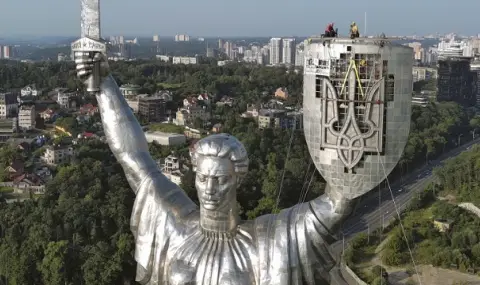People in Ukraine continue to believe in victory over Russia. However, they are increasingly willing to negotiate with Moscow and can even imagine liberating the territories occupied by Russia later.
Ukraine has experienced another difficult year. After the Ukrainian offensive in Russia's Kursk region in the summer, Russia has stepped up its attacks on the Donetsk and Kharkiv regions, as well as on energy infrastructure and cities. According to calculations by the "Wall Street Journal” Moscow has used four times as many drones and missiles this fall than in the fall of 2023.
At the same time, Donald Trump's election victory in the US has caused uncertainty among Ukrainians. Although Trump has declared that ending the war in Ukraine is a foreign policy priority for him, it is still unclear how a peaceful solution will be achieved. It is also unclear to what extent the United States will continue to support Ukraine militarily and financially. However, according to experts, more and more Ukrainians are hoping for a quick end to the war through peace negotiations.
"The important thing is that we held on"
Volodymyr Fesenko of the "Penta" Center for Political Studies believes that 2024 was the hardest year of the war so far - excluding the first weeks of the full-scale invasion in the spring of 2022. "The most important thing is that we held on", he is categorical. Despite the fatigue, people in Ukraine remain "surprisingly optimistic", says Anto Khrushchevskiy of the Kiev Institute of Sociology. According to surveys, between 83 and 88 percent believe in victory.
"There is also pessimism, however - because of fears about the future or the feeling that the West does not support us enough", the sociologist explained to DW. "Big words are often not followed by big actions. Ukrainians simply do not have the opportunity to lay down their arms. They know that this war is a matter of survival". The number of those who are ready to continue the war as long as necessary remains stable - around 60 percent.
The desire for negotiations does not mean the desire for concessions
At the same time, however, the idea of negotiations with Russia is receiving increasing approval. Compared to the previous year, the share of Ukrainians who categorically reject them has decreased from a third to 12%, according to a survey by the Institute for Public Opinion Research conducted in November.
On "Independence" Square in Kiev, where the number of flags with the names of fallen Ukrainians is increasing every day, DW spoke with Yevgeny. The Ukrainian soldier believes that negotiations with Russia are inevitable. At the same time, he hopes that they will develop in Ukraine's favor. "Everything depends on the situation on the front. We need the help of our partners, we must continue the fight, support the army and do everything possible to achieve victory," he says. At the same time, he is skeptical about the strategy of waging war until all occupied territories are liberated.
Mykhailo Mishchenko from the "Razumkov" research center believes that people's opinion about the negotiations is influenced primarily by the change in the rhetoric of the Ukrainian authorities, who since the summer no longer exclude such a scenario. "Like the government, the people say they are ready for negotiations, but they don't want to give up any territories", says Mishchenko. The majority sees negotiations as a way to achieve an acceptable result for Ukraine, including the return of the occupied territories. However, according to the research center, the share of Ukrainians who would cede occupied territories to Russia in the name of peace has slightly increased from five to nine percent over the year.
According to Khrushchev, more than half of Ukrainians are ready to postpone the liberation of the occupied territories in the name of peace, but only if they receive effective security guarantees. "They don't want a second Budapest Memorandum", says the expert, recalling the promises made to Ukraine by the United States, Britain and Russia in 1994.
Serhiy Solodky of the Ukrainian think tank "New Europe Center" in Ukraine, he believes that two trends are emerging - either to rely on one's own forces or on collective defense. The researcher says that about 31% of Ukrainians believe that possession of nuclear weapons is the best defense strategy, and 29% approve of gradual integration into NATO as the preferred option. The third most popular option - about 11% - is a defense alliance with the United States with the possibility of deploying American troops. UN peacekeeping troops are considered the best guarantee of security by 8.9%, and the troops of European countries - by only 6.4%.
Ukrainians have high expectations of Trump
Political scientist Volodymyr Fesenko believes that Donald Trump's inauguration will change a lot for Kiev. While the previous US administration under Democrat Joe Biden has always stressed that Kiev should set its own time for negotiations, Trump is firmly committed to them. However, he does not have a clear strategy for sustainable peace, criticizes Fesenko and emphasizes: "Therefore, the most important task is to find the key to Trump so that we can enter negotiations from a strong position."
Despite Trump's contradictory statements regarding the war in Ukraine, according to Info Sapiens in Ukraine he enjoys the highest level of trust in Europe - almost 45%. The "New Europe" Center explains this by the expectation that Trump will pursue a decisive policy towards Ukraine and ensure peace. Pensioner Oleksiy believes that Trump may be unpredictable, but Ukraine will still be able to work with him. "If Russia is not ready to make any agreements, then Trump will have no choice but to help Ukraine," he believes.
